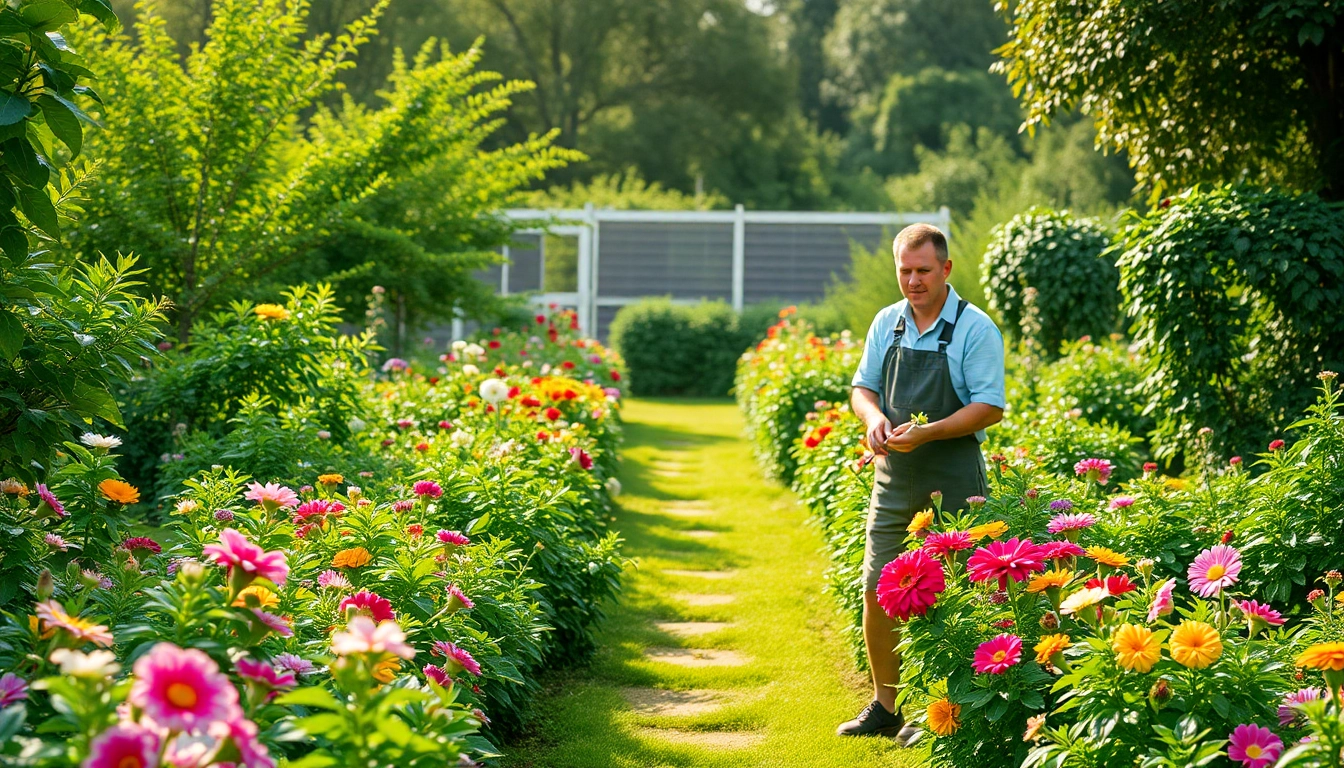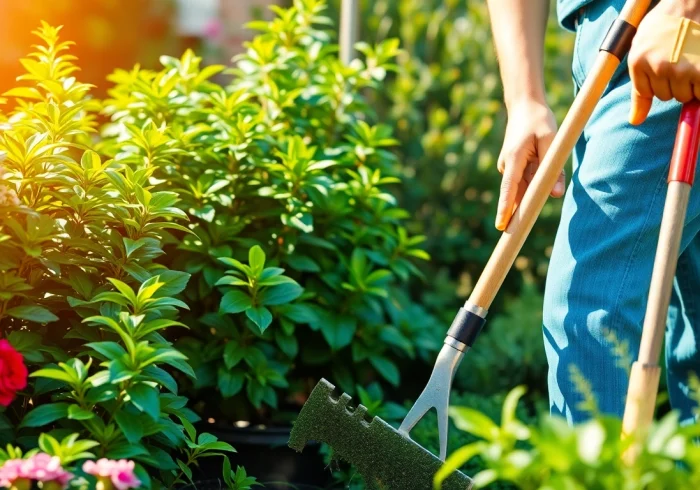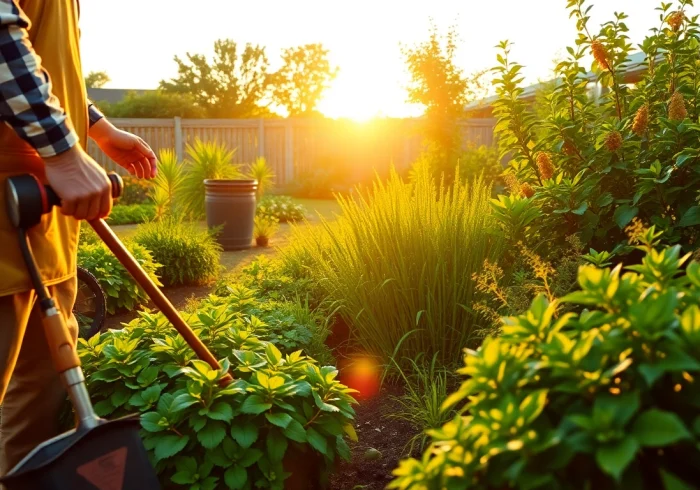Understanding Garden Maintenance Services
Maintaining a garden is not merely about planting flowers or mowing the lawn; it encompasses much more. A comprehensive garden maintenance service entails a spectrum of practices aimed at nurturing and preserving garden health throughout the seasons. In this guide, we will delve deep into the significance of garden maintenance, its benefits, and the tasks involved to assist homeowners in making informed decisions related to garden upkeep.
What Is Garden Maintenance?
Garden maintenance is an ongoing process that involves the regular care and management of gardens. This includes both aesthetic and practical aspects, ensuring that plants remain healthy, well-structured, and visually pleasing. The goal of garden maintenance is to enhance the health of plants, increase floral blooms, maintain landscape design, and promote a thriving ecosystem where plants can flourish.
Benefits of Professional Services
Residential garden maintenance services offer several benefits that often outweigh doing it yourself:
- Expertise: Professional gardeners possess specialized knowledge about plants, soil types, pest management, and local climate conditions. This expertise is crucial for optimizing garden health.
- Time-Saving: Garden maintenance can be time-consuming. Hiring professionals frees up homeowner time while ensuring gardens are in expert hands.
- Access to Tools and Technology: Professionals come equipped with advanced tools and technologies that may not be affordable for homeowners to purchase themselves, ensuring efficient and effective care.
- Regular Maintenance Schedule: Professionals often schedule routine services, ensuring that garden tasks are carried out consistently and preventing issues before they arise.
- Customized Services: Professional services can be tailored to fit specific needs, ensuring that each garden receives the unique attention it requires.
Common Tasks Included in Garden Maintenance
Professional garden maintenance encompasses a wide array of services. Some of the most common tasks include:
- Weeding: Regular removal of weeds to prevent them from competing for nutrients and space with desired plants.
- Mulching: Applying mulch helps retain moisture, suppress weeds, and provides a clean base for plant growth.
- Pruning and Trimming: Essential for flowering shrubs and trees, pruning helps control growth, remove dead or diseased branches, and promotes better air circulation.
- Fertilizing: Applying appropriate fertilizers is crucial for providing the necessary nutrients for optimal plant growth.
- Pest Control: Implementing integrated pest management practices to protect plant health from harmful pests.
- Lawn Care: Regular mowing, edging, and aeration to ensure a lush lawn complements the garden.
- Seasonal Clean-up: Removing dead foliage and preparing the soil for seasonal transitions enhances overall garden health.
Choosing the Right Garden Maintenance Service
Finding the right garden maintenance service is crucial in ensuring your garden receives the care it needs. Here are key factors to consider:
Factors to Consider When Selecting a Service
When looking for a suitable garden maintenance provider, consider the following:
- Reputation and Reviews: Explore reviews and testimonials from previous clients to gauge the service’s reliability and quality of work.
- Experience: Generally, companies with years of experience bring a depth of understanding and problem-solving capabilities.
- Services Offered: Ensure the service offers the specific maintenance tasks that your garden requires.
- Local Knowledge: A provider familiar with local flora and climate conditions can better cater to your garden’s unique needs.
- Insurance and Certifications: Verify that the company has suitable insurance and certified staff, which protects you and your property.
Questions to Ask Potential Providers
To ensure you are making the right choice, consider asking the following questions during your selection process:
- What specific services do you offer?
- Can you provide references from past customers?
- How do you handle pest control?
- What is your pricing structure?
- Will you provide a written contract outlining services and costs?
Evaluating Costs and Services Offered
Understanding the costs associated with garden maintenance can help you adjust your budget. Professionals typically charge based on a variety of factors:
- Size of the Garden: Larger gardens will generally cost more to maintain than smaller ones due to the increased labor and resources required.
- Type of Services: Regular maintenance such as mowing or planting may cost less compared to specialized services like tree surgery.
- Frequency of Visits: Weekly, bi-weekly, or monthly services can affect the overall cost, with more frequent visits likely resulting in higher billing.
- Location: Prices can vary significantly based on geographic location and the local cost of living.
Seasonal Tips for Effective Garden Maintenance
Understanding the seasonal needs of your garden can help ensure its health and longevity. Each season presents unique challenges and opportunities for garden care:
Spring Preparation for Your Garden
Spring is a critical time for preparing your garden after a long winter:
- Conduct a thorough clean-up to remove debris and dead plants.
- Start planting seasonal flowers and vegetables suited to the local climate.
- Apply a layer of mulch to retain soil moisture as temperatures rise.
- Fertilize gardens to provide an early boost to plants as they begin to grow.
Summer Care for Thriving Plants
Summer maintenance focuses on sustaining growth under potentially hot and dry conditions:
- Water regularly and deeply, especially during prolonged dry spells.
- Monitor for pests and diseases—early detection can prevent broader issues.
- Deadhead flowers to encourage more blooms.
- Adjust weeding frequency to combat encroaching weeds effectively.
Autumn Cleanup and Winter Preparations
Preparing your garden for winter is essential to ensuring its health when spring returns:
- Remove dead plants and debris to prevent harboring pests and diseases.
- Cut back perennials and prepare soil for winter.
- Plant bulbs for spring blooms before the ground freezes.
- Protect sensitive plants with frost cover or mulch.
DIY vs. Professional Garden Maintenance
The decision to manage your garden maintenance personally or hire professionals can significantly impact its health and aesthetics. Here’s what to consider:
When to Hire a Professional Service
Hiring a professional service may be the right choice when:
- Your garden is extensive and requires regular attention that you cannot provide.
- You lack the knowledge or expertise to maintain specific plant types effectively.
- You need to solve particular issues, such as pest infestations or diseases.
- You find yourself too busy with other commitments to dedicate time to garden care.
Effective DIY Gardening Tips
For those inclined to manage their gardens, here are some effective DIY gardening tips:
- Start small—focus on manageable areas and gradually expand as you gain confidence.
- Educate yourself on plant care through local gardening clubs, workshops, or online resources.
- Invest in quality gardening tools to make tasks easier and more effective.
- Schedule regular maintenance tasks to create a routine that keeps your garden healthy.
Understanding Costs of Each Approach
Whether going DIY or hiring professionals, it’s essential to understand the overall costs involved. A DIY garden may seem cost-effective, yet the expenses involved in tools, supplies, and potential mistakes can add up. In contrast, hiring professionals often represents a higher immediate expense but can save you time, effort, and the cost of correcting issues in the long run.
Maximizing Your Garden’s Potential
To ensure your garden thrives, consider implementing modern trends and practices in garden maintenance:
Trends in Garden Maintenance Services
Emerging trends in garden maintenance services reflect broader societal shifts towards sustainability and personalized care:
- Organic Gardening Practices: More gardeners are opting for organic methods to avoid harmful chemicals, focusing instead on natural pest control and fertilization.
- Smart Technology: The use of smart irrigation systems and garden monitoring apps enables homeowners to optimize watering schedules and track plant health.
- Landscape Design Integration: Professional services are increasingly offering landscape design as a comprehensive part of maintenance, ensuring aesthetic beauty aligns with plant health.
Incorporating Sustainable Practices
Sustainability is a critical focus for modern gardeners. Practices include:
- Composting organic waste to create nutrient-rich soil amendments.
- Using native plants that require less water and care while supporting local ecosystems.
- Implementing rain gardens or other water conservation techniques.
Measuring the Impact of Maintenance on Garden Health
It’s crucial to monitor and measure the health of your garden regularly. Indicators of good maintenance include:
- Vibrant plant growth and prolific blooms.
- Healthy soil structure with good drainage and moisture retention.
- A balanced ecosystem visible through the presence of beneficial insects and pollinators.
To sum up, garden maintenance is essential for anyone looking to enhance their outdoor space. From selecting the right garden maintenance service to understanding seasonal needs, proper practices can ensure a flourishing garden. Whether you choose a DIY approach or enlist professional help, staying informed and proactive is key to achieving a vibrant, healthy garden.



